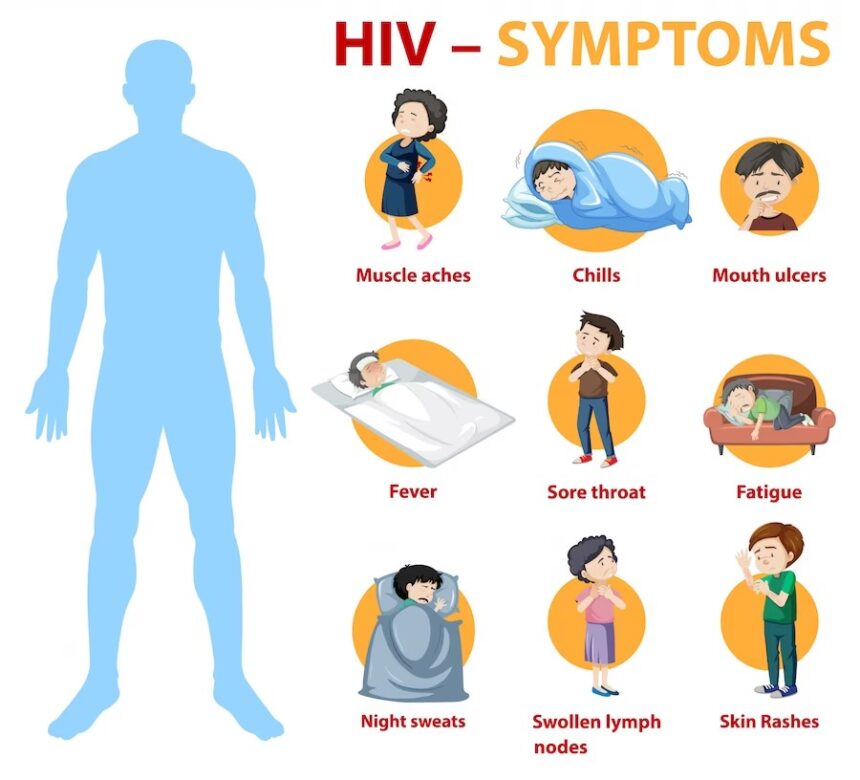HIV/AIDS remains a significant public health concern in South Africa, with a high prevalence rate in certain regions. Early detection and timely treatment are critical in managing the disease and improving the quality of life for individuals living with HIV/AIDS. In this article, we will discuss the common symptoms of HIV/AIDS in South Africa, aiming to increase awareness and promote early recognition for prompt medical intervention.
- Flu-Like Symptoms: Many people experience flu-like symptoms within a few weeks of contracting HIV. These symptoms may include fever, sore throat, swollen glands, fatigue, and body aches. It is important to note that these symptoms are not exclusive to HIV/AIDS and can be associated with other conditions as well. However, if you have engaged in activities that put you at risk of HIV transmission, it is essential to consider these symptoms seriously and seek medical advice.
- Persistent Fatigue: Fatigue is a common symptom experienced by individuals with HIV/AIDS. It is characterized by persistent exhaustion, lack of energy, and a feeling of being constantly tired, even after getting sufficient rest. Fatigue can significantly impact daily activities and overall quality of life.
- Rapid Weight Loss: Unintentional weight loss is a common symptom in people living with HIV/AIDS. It may occur due to various factors, including decreased appetite, malabsorption of nutrients, and changes in metabolism. Significant and unexplained weight loss, typically defined as losing more than 10% of body weight within a short period, should be evaluated by a healthcare professional.
- Persistent Diarrhea: Chronic diarrhea is a symptom that may develop in individuals with advanced HIV/AIDS. It can be caused by opportunistic infections or gastrointestinal complications associated with the weakened immune system. If you experience persistent diarrhea lasting for more than a couple of weeks, seek medical attention for an evaluation.
- Recurrent Infections: HIV weakens the immune system, making individuals more susceptible to various infections. Common recurrent infections associated with HIV/AIDS include oral thrush (white patches in the mouth), frequent and severe respiratory infections, persistent skin rashes, and recurrent urinary tract infections. These infections may indicate an underlying immune deficiency and should not be ignored.
- Swollen Lymph Nodes: Enlarged lymph nodes, particularly in the neck, armpits, and groin, can be a sign of HIV infection. Lymph nodes are an integral part of the immune system, and their enlargement indicates an immune response to infections. If you notice swollen lymph nodes that are persistent, painless, or accompanied by other symptoms, consult a healthcare professional.
- Skin Changes: HIV/AIDS can cause various skin-related symptoms, including rashes, dryness, itching, and sores. These skin changes can occur due to the direct effect of the virus, opportunistic infections, or side effects of medications used to manage the disease. Any significant and persistent skin changes should be evaluated by a healthcare provider.
Recognizing the symptoms of HIV/AIDS is crucial for early detection, timely treatment, and improved outcomes for individuals living with the virus. It is important to note that the presence of these symptoms does not confirm an HIV infection, as they can also be associated with other conditions. However, if you have engaged in behaviors that put you at risk of HIV transmission or suspect you may have been exposed to the virus, it is important to consult a healthcare professional for appropriate testing and guidance. Early diagnosis and access to HIV/AIDS treatment and care can significantly improve the prognosis and quality of life for individuals affected by this disease in South Africa.










